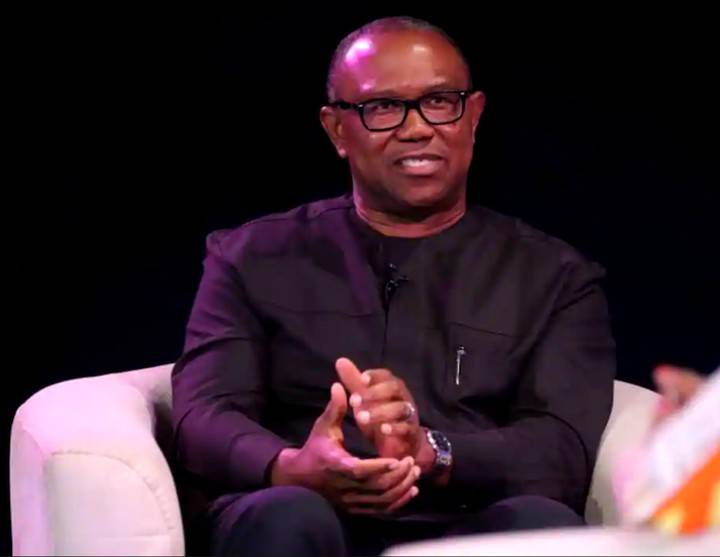It was a chance meeting but it was worth the opportunity. Dr. Peter Gregory Onwubuasi Obi, simply known as Peter Obi, is the Presidential candidate of the Labour Party, LP.
You cannot begin to discuss Obi in terms of education without becoming a bore.
Is it University of Nsukka; Lagos Business School; Harvard Business School, Boston, USA; London School of Economics; Columbia Business School, New York, U.S.A; Institute for Management Development, Switzerland; Kellogg Graduate School of Management, U.S.A; Oxford University, Said Business School; Cambridge University, George Business School? Where do you start from?
Obi pontificates a lot and it sometimes verges on effusive sanctimony about a sense of knowledge. Some Nigerians are not comfortable with that but he moves.
However, he can be forgiven, having served on the Federal Government or National Economic Council Committee on Minimum Wage; Negotiation with Labour on Subsidy; Committee on Mass Transit; Committee on Natural Resource; Committee on Power Sector Reform; Committee on Sharing of MDGs Funds; Committee on Accurate Data on Nigeria’s Oil Import and Export; Agricultural Transformation Implementation Council; Sub-Committee on Needs Analysis of Public Universities in Nigeria: or Review Committee on the Power Sector. His participation in those committees suggests that he would be versed in the issues. But this is now a presidential contest which is not just about being cerebral.
In this interview, Obi speaks about the coalition to take back Nigeria. He discusses a number of issues in the little time we had.
Excerpts:
You have consistently maintained that education is the bedrock of development. Now, let’s look at this ASUU issue. The President reportedly gave his education Minister a two week ultimatum to resolve the issue. What’s your take?
What we have on our hands is a situation that requires presidential intervention. The minister that has been given an ultimatum has not just been appointed to oversee the education sector. It is not that he has just been drafted to do the job. This is a job that has not been done to deliver on an outcome that is desirable, so, giving an ultimatum to your minister is like saying, continue to talk as they’ve been doing?
President Buhari is the one on whose desk the buck stops. He should sit with ASUU and engage and resolve this matter. If he can sit with party leaders over presidential primaries and get a result, he should sit with ASUU and ensure that this strike comes to an end.
Then, our political leaders, too, should please take this matter very seriously.
A situation where we have local government councillors and chairmen and assembly members earning much more than professors is not ideal. Education is key. The President should take charge. The same things goes for the looming food crisis. Our President should spend the remaining nine or ten months to take personal charge.
NLC has threatened to embark on a solidarity strike this week?
The President should pay serious attention, personally, to the ASUU strike. The most important investment a nation can give to its citizens is education.
And for Nigeria, it is even more critical because today, Nigeria is one of the worst, globally, in terms of human capital. We are 152 over 158 and I’ve always said it that when we talk about the infrastrucrure that is going to drive development, the first infrastructure you need is the human infrastrucure. You cannot talk about physical infrastructure unless you’ve dealt with human infrastructure and education is key.
Today, we borrow money and borrow labour from China. What that shows is that you’ve not built your human infrastructure – and it’s like you’re not building your future. So, the President needs to take control immediately. And the issue of health, education and pulling people out of poverty are the most critical agenda for development and he should take control of it forthwith.
But, recently, the presidential candidate of the All Progressives Congress, APC, reportedly said the President has given him the mandate to wade into the crisis of ASUU?
I wonder what that means. Our children have not been in school for months now. It also happened in 2020. The global average for tertiary institution intake is about 38% . In the Western world it is 50%. Nigeria’s is 9% – we are not even a quarter of the global average. Our team has tried to engage and study, even if for knowledge sake, the issues around ASUU, because you need to explore and study what the issues are and we have our own ideas of how we can be able to invest and do more about education at the basic level and how we can support the tertiary level to ensure that we have something better. Our team cannot imagine being on the seat for three months and we will have the issue of that magnitude and I wont engage personally. Even as a governor, we had a similar issue and I had to personally engage ASUU which is why we resolved it in Anambra State and our state university is on.



No comments yet
Be the first to share your thoughts!